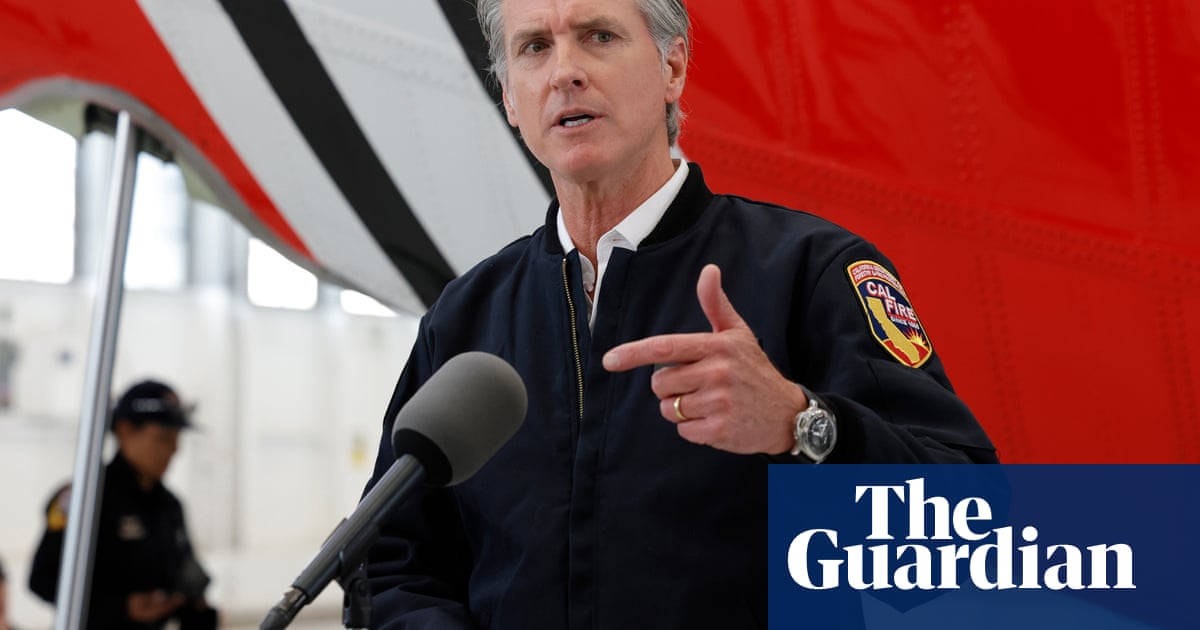The California governor, Gavin Newsom, has proposed a $7.5bn tax credit program and offered to work withDonald Trumpto boost US film production after the president threatened to slap 100% tariffs on films made abroad, alarming industry executives in Hollywood and abroad.
Newsom – who has had an often fractious relationship with Trump – unveiled his idea after Hollywood reacted nervously to the president’s tariffs plan, which sent share values in some film and media companies plummeting.
In a statement, Newsom said California – the historic home of the US film industry – was “eager to partner with the Trump administration to further strengthen domestic production and Make America Film Again”.
“America continues to be a film powerhouse, and California is all in to bring more production here,”Newsom said.
A spokesperson for his office told the Washington Post that the program, if it came to fruition, would be the biggest government tax initiative for the film industry in US history and the first at a federal level.
The initiative was triggered after Trump posted on hisTruth Socialplatform that the US film industry was “dying” and unveiled plans for a tariffs on overseas-made productions to reverse the trend, which he called “a national security threat”.
Tax incentives and subsidies have seen an increasing number of big productions being shot on location in countries like Britain, Canada and the Czech Republic, reversing a historic trend that saw most Hollywood films during the 20th century shot in Los Angeles
This year’s biggest-grossing film, A Minecraft Movie, was shot in Canada, while the next film in the Mission: Impossible series, due for release on Memorial Day, was shot in the UK and other foreign locations.
Hollywood executives reacted with alarm to Trump’s tariff plan,the Wall Street Journalreported, noting they “expressed confusion over how a levy could be applied to intellectual property with no specific monetary value”. The Journal also noted that the executives were fearful of retaliatory tariffs as they could impact their overseas business.
On Monday, shares in media companies and movie theater chains like Disney, Netflix and beyond fell.
The Journal also reported that Jon Voight, the 86-year-old actor and Trump appointed “special ambassador” to Hollywood, discussed a federal policy with tax incentives and infrastructure subsidies to encourage studios to conduct more of their production work in the US at a meeting with Trump at Mar-a-Lago last weekend.
In a statement on Monday, Voight said: “We look forward to working with the administration, the unions, studios and streamers to help form a plan to keep our industry healthy and bring more productions back to America.
Sign up toHeadlines US
Get the most important US headlines and highlights emailed direct to you every morning
after newsletter promotion
“By creating the right environment through smart incentives, updated policies, and much-needed support, we can ensure that American production companies thrive, more jobs stay here at home, and Hollywood once again leads the world in creativity and innovation.”
Voight and his manager, Steven Paul, reportedly submitted a “comprehensive plan” to Trump about “what changes need to be made to increase domestic film production,” according toNBC News.
Newsom’s tax credit proposal would be based on anexisting film and television tax credit programthat his office says has generated more than $26bn since it was introduced in 2009. Last October, thegovernor announced a planto extend the scheme to $750m annually, more than doubling its $330m annual allocation.
Some critics have questioned the effectiveness of such credits. In testimony to the state’s Senate Revenue and Taxation Committee in March, Michael Thom, a professor at the University of Southern Californiawho studies the financial implications of state incentives to attract the film industry,saidsuch initiatives “fail to stimulate enough economic activity to justify their substantial cost”.
“Simply put, California cannot afford the existing incentive, much less a substantial expansion to it,” he said.
